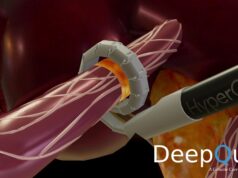
Three months after undergoing renal denervation, patients with untreated high blood pressure had statistically significant reductions in average blood pressure over 24 hours compared with patients who underwent a sham procedure according to results from the SPYRAL-HTN OFF MED pivotal trial presented at the American College of Cardiology/World Congress of Cardiology’s virtual scientific sessions (ACC.20/WCC Virtual).
Further, these patients experienced no major device- or procedure-related safety events through three months, data from an international, prospective, single-blinded, sham-controlled trial that enrolled at 46 global study sites shows. The findings were also published online on 29 March in The Lancet.
The SPYRAL HTN-OFF MED pivotal trial builds upon a previous pilot study and is powered to evaluate the efficacy of catheter-based renal denervation in the absence of medications. “These results show that renal denervation offers an effective alternative approach to traditional medications that require patient adherence for reducing blood pressure,” comments Michael Böhm (Saarland University Medical Center, Hamburg, Germany) and lead author of the study, in a press release from the ACC.
“Furthermore, the findings show that renal denervation lowers blood pressure not just during the day but also through the night and [in the] early morning periods when risk is highest for [adverse] clinical events and the effect of some medications on blood pressure is reduced,” Bohm adds.
Böhm and colleagues report in The Lancet: “Catheter-based renal denervation has significantly reduced blood pressure in previous studies. Following a positive pilot trial, the SPYRAL HTN-OFF MED (SPYRAL Pivotal) trial was designed to assess the efficacy of renal denervation in the absence of antihypertensive medications.”
The study enrolled 331 patients whose average systolic blood pressure over 24 hours was between 140 and 170mmHg. Their average age was 53 years, and 67% were men. Most had obesity, with an average body mass index of 31. Around 5% also had type 2 diabetes. A condition of enrolment was that patients either had not been taking any blood pressure-reducing medications or had discontinued those medications at least three weeks before their blood pressure was measured at study entry.
 Patients were randomly assigned to receive either renal denervation or a sham procedure in which a catheter was inserted and only an angiography was performed. A total of 166 patients were assigned to renal denervation and 165 to the sham procedure.
Patients were randomly assigned to receive either renal denervation or a sham procedure in which a catheter was inserted and only an angiography was performed. A total of 166 patients were assigned to renal denervation and 165 to the sham procedure.
At the end of three months, the primary efficacy endpoint was the change in average 24-hour systolic blood pressure, adjusted for systolic blood pressure at study entry. The secondary efficacy endpoint was the change in average blood pressure measured in the doctor’s office at three months, adjusted for office blood pressure at study entry. Major adverse safety events were also assessed at three months, including rates of death, stroke, changes in kidney function or any injury to the arteries surrounding the kidney.
For the primary and secondary efficacy endpoints, the difference between groups was –3.9mmHg for 24-hour systolic blood pressure and –6.5mmHg for office systolic blood pressure, both favouring the renal denervation group, with a 99.9% probability that renal denervation was superior to the sham procedure.
No deaths, strokes or changes in kidney function occurred during the three-month follow-up period, Böhm says. He added that these results may not demonstrate the total decrease in blood pressure achieved with renal denervation given the short follow-up period due to ethical and safety concerns that patients needed to be restarted on antihypertensive medications. In other studies of renal denervation, however, patients’ blood pressure has continued to decline at six months or more after the procedure, he states.
“This study establishes renal denervation as an additional option beyond exercise or lifestyle modification for patients with high blood pressure who are unwilling to take or cannot tolerate medication,” Böhm says, adding that the study results will be included in an application for FDA approval of the renal denervation device used in the trial for the treatment of patients who are not taking blood pressure-reducing medication. Currently there are no renal denervation devices approved for use in the USA.
Results from a companion study, the SPYRAL-HTN ON MED trial, which is testing the safety and effectiveness of renal denervation in patients who are taking up to three blood pressure-reducing medications, are expected in about 18 months. The results of that study will also be included in the application for FDA approval of the renal denervation device, Böhm said.








